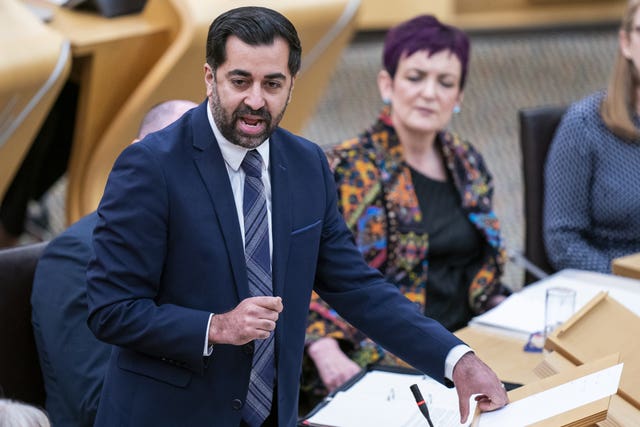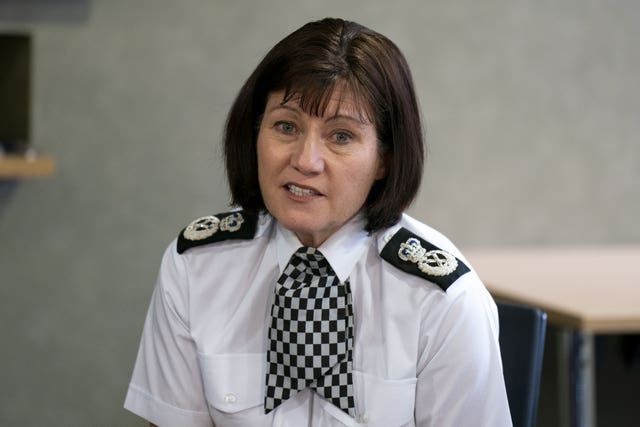The Hate Crime Act which comes into force on Monday could lead to trust in the police being damaged, the president of the body which represents senior Police Scotland officers says.
Rob Hay, president of the Association of Scottish Police Superintendents (ASPS) said there could be an increase in reports of hate crimes, driven by people wishing to score points against those on opposite sides of an argument online.
The Hate Crime and Public Order (Scotland) Act comes into effect on Monday.
Critics, including some celebrities like JK Rowling, say it will have a chilling effect on free speech, but First Minister Humza Yousaf has defended the legislation.

Mr Yousaf has said “disinformation” has been spread about the Hate Crime Act and there is a “triple lock” to protect free speech.
Chief Superintendent Hay discussed the law on the BBC’s Sunday Show.
He said ASPS was supportive of the objectives of the Act in tackling hatred against protected groups, but they had concerns around police resourcing.
The senior officer also said the “febrile” context of online debate could affect the way the law is seen.
Mr Hay said: “Our concern is that could impact through a huge uplift, potentially, in reports – some of those potentially made in good faith but perhaps not meeting the threshold of the legislation.
“Or potentially in cases where people are trying to actually actively use the legislation to score points against people who sit on the other side of a particularly controversial debate.
“Sitting within the middle of all that will be a police officer, who will have to make a judgment on whether the threshold is met for the legislation, and whether any of the protections afforded in law can be applied.”
He said members of the public may feel “aggrieved” if their details are kept by police who have received a report of a hate crime, even if they do not pursue a prosecution.
He continued: “So there are two ways potentially that we could damage trust and confidence in the police, around whether the police response meets with expectations, and whether have the police exceeded themselves in involving themselves in non-criminal matters.”
Police officers would be placed in a “really difficult position” in such circumstances, he said.

The ASPS president has previously written to a Holyrood committee, voicing fears that those on the “activist fringe” of political viewpoints could seek to “weaponise” the law.
He said the idea that police would target comedians and theatre actors “couldn’t be further from the truth”.
Police Scotland’s Chief Constable Jo Farrell has said the new law will be applied proportionately, upholding people’s freedom of expression.
Earlier in March she told the force’s oversight body that officers are being trained to apply the law in a “measured way, using their discretion and their common sense”.
Mr Yousaf was asked about ASPS’ letter at First Minister’s Questions on Thursday.
He said: “Of course we take seriously what was said by the Scottish Police Federation, ASPS or any other representative organisation representing police officers.
“But I think it is incumbent on me to say that the new offences in relation to stirring up are hugely important.
“Those stirring up offences for racial hatred have existed since 1986, we are simply extending those protections to other groups.”
The First Minister said he is confident in police officers’ ability to deal with vexatious complaints.
Scottish Green minister Patrick Harvie was asked about the ASPS president’s comments on the Sunday Show later.
He said he did not disagree with the senior officer, in that the fact police need to make a judgment on what constitutes a criminal offence is “not new”.
Mr Harvie added: “There are people out there wildly misrepresenting what is in the hate crime legislation, what it will mean.
“For the most part, they’re trying to drag it into a kind of culture war space.
“Some of the people on the right in particular use phrases like free speech as though it only means the freedom to be abusive and vile and unpleasant and prejudiced.”
The Tenants’ Rights minister criticised comments from the Conservatives, saying: “I’ve had direct threats of violence as a result of people reading that kind of inflammatory misinformation in the media.”
A spokesman for the Scottish Government said: “The Hate Crime Act will help to tackle the harm caused by hatred and prejudice and provide greater protections for victims and communities. The right to freedom of expression is built into the legislation.
“The laws have a high threshold for proving offences of stirring up hatred and the supporting materials explain how the thresholds of the offences are assessed.
“Police Scotland have given assurances that those targeted by hate crime will be treated with dignity and respect, that the circumstances they report will be fully investigated.
“We have worked with partners, including Police Scotland, to ensure effective implementation of the legislation and the timetable for commencement has allowed for the delivery of a robust package of training and guidance for police officers.
“Training of police officers is an operational matter to Police Scotland, with whom we will continue to work closely, and the chief constable has said police officers are being trained to apply the law in a ‘measured way, using their discretion and their common sense’.”




Comments: Our rules
We want our comments to be a lively and valuable part of our community - a place where readers can debate and engage with the most important local issues. The ability to comment on our stories is a privilege, not a right, however, and that privilege may be withdrawn if it is abused or misused.
Please report any comments that break our rules.
Read the rules hereComments are closed on this article